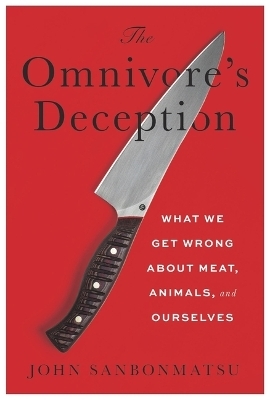
The Omnivore’s Deception
What We Get Wrong about Meat, Animals, and Ourselves
Seiten
2025
New York University Press (Verlag)
978-1-4798-2596-7 (ISBN)
New York University Press (Verlag)
978-1-4798-2596-7 (ISBN)
- Noch nicht erschienen (ca. Juni 2025)
- Versandkostenfrei
- Auch auf Rechnung
- Artikel merken
Offers the most powerful case yet for ending our exploitation of animals for food
Millions of Americans see themselves as "conflicted omnivores," worrying about the ethical and environmental implications of their choice to eat animals. Yet their attempts to justify their choices only obscure the truth of the matter: in John Sanbonmatsu’s view, killing and eating animals is unethical, regardless of whether they are "free range" or factory farmed. Shattering the conventional wisdom around the meat economy, he reframes the question of animal agriculture from one of "sustainability" to one of existential and moral purpose, presenting a powerful case for the total abolition of the animal economy. In a rejoinder to Michael Pollan and other critics who have told us that we can have our meat and our consciences, too, he shows why "humane meat" is always a contradiction in terms.
The Omnivore’s Deception provides a deeply observed philosophical meditation on the nature of our relationship with animals. Peeling back the myriad layers of myth, falsehoods, and bad faith that keep us eating meat, the book offers a novel perspective on our troubled relations with animals in the food economy. The problem with raising and killing animals for food isn't just that it's "bad for the environment,” but the wrong way to live a human life.
A tour de force of moral philosophy and cultural critique, The Omnivore's Deception will change the way we think about meat, animals, and human purpose.
Millions of Americans see themselves as "conflicted omnivores," worrying about the ethical and environmental implications of their choice to eat animals. Yet their attempts to justify their choices only obscure the truth of the matter: in John Sanbonmatsu’s view, killing and eating animals is unethical, regardless of whether they are "free range" or factory farmed. Shattering the conventional wisdom around the meat economy, he reframes the question of animal agriculture from one of "sustainability" to one of existential and moral purpose, presenting a powerful case for the total abolition of the animal economy. In a rejoinder to Michael Pollan and other critics who have told us that we can have our meat and our consciences, too, he shows why "humane meat" is always a contradiction in terms.
The Omnivore’s Deception provides a deeply observed philosophical meditation on the nature of our relationship with animals. Peeling back the myriad layers of myth, falsehoods, and bad faith that keep us eating meat, the book offers a novel perspective on our troubled relations with animals in the food economy. The problem with raising and killing animals for food isn't just that it's "bad for the environment,” but the wrong way to live a human life.
A tour de force of moral philosophy and cultural critique, The Omnivore's Deception will change the way we think about meat, animals, and human purpose.
John Sanbonmatsu is Associate Professor of Philosophy at the Worcester Polytechnic Institute in Worcester, MA. He is the editor of Critical Theory and Animal Liberation and author of The Postmodern Prince: Critical Theory, Left Strategy, and the Making of a New Political Subject.
| Erscheint lt. Verlag | 17.6.2025 |
|---|---|
| Verlagsort | New York |
| Sprache | englisch |
| Maße | 152 x 229 mm |
| Themenwelt | Geisteswissenschaften ► Philosophie |
| Medizin / Pharmazie ► Gesundheitsfachberufe ► Diätassistenz / Ernährungsberatung | |
| Sozialwissenschaften ► Soziologie | |
| ISBN-10 | 1-4798-2596-4 / 1479825964 |
| ISBN-13 | 978-1-4798-2596-7 / 9781479825967 |
| Zustand | Neuware |
| Haben Sie eine Frage zum Produkt? |
Mehr entdecken
aus dem Bereich
aus dem Bereich
Indikation, Diagnostik, Therapie
Buch (2024)
Thieme (Verlag)
CHF 109,95
Physiologische Grundlagen, Prävention, Therapie
Buch | Hardcover (2023)
Wissenschaftliche Verlagsgesellschaft
CHF 165,20


